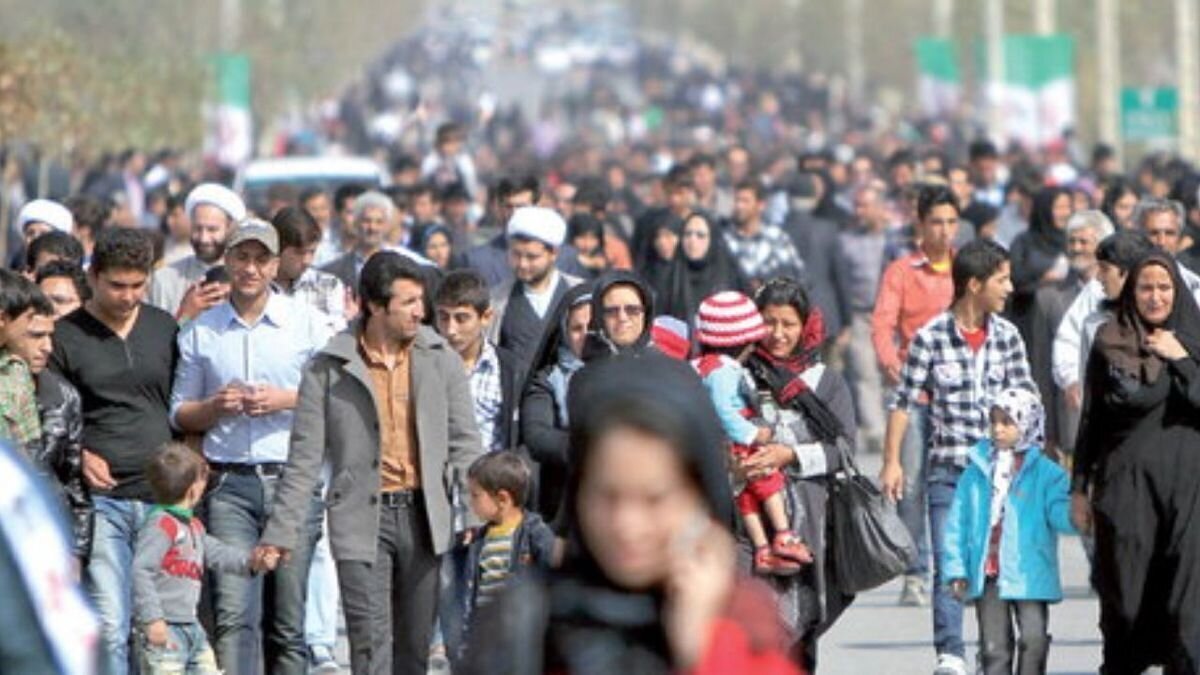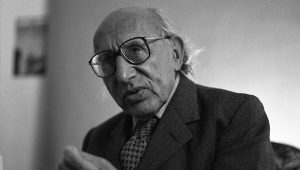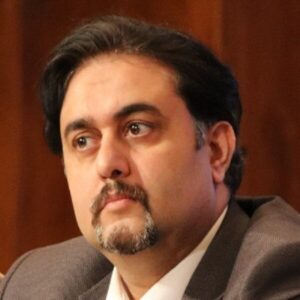Thought group: According to the news agency Online newsNewspaper the homeland In an article written by Dr. Mohsen Guderzi, a sociologist and opinion poll researcher, he has examined the social indicators of the society. Along with the dangerous developments in the region, his expert observation of the mood of the society indicates a dire situation that needs to be addressed urgently. In other words, the condition of the society is very bad, and the extremists are often unaware of the indicators of the society in which they live. Godarzi’s article about the dire state of society, in 4 areas of nation-state gap, erosion of social capital, decline of religious behaviors and beliefs, and the intensification of the feeling of decline and hope for the future, will be reviewed below:
***
From the eyes of the people, the country is on the path of decline and has a disappointing future ahead of it. This mental image is obtained from numerous surveys conducted in the country. In this report, several main trends in people’s attitudes are mentioned in a very compact way:
1- Growing separation and gap between society and government
2- Erosion of social capital
3- The decline of religious behaviors and beliefs
4- Intensification of the feeling of social decay and a dark vision of the future
Separation and gap between society and government
According to the research findings, people are distancing themselves from the government institutions day by day, so that the belief has prevailed among them that the government does not pay attention to their wishes and opinions and its performance is not focused on the needs and wishes of the people. As a result, the credibility of government institutions has collapsed in the minds of the people and has disturbed their relationship with the government. According to the findings, people’s trust in government institutions has a downward trend. The majority of people consider the government to be unsuccessful in performing its basic duties such as providing the level of welfare and enforcing the law. As a result, negative emotions such as fear, resentment, feelings of insignificance and social humiliation have become common.
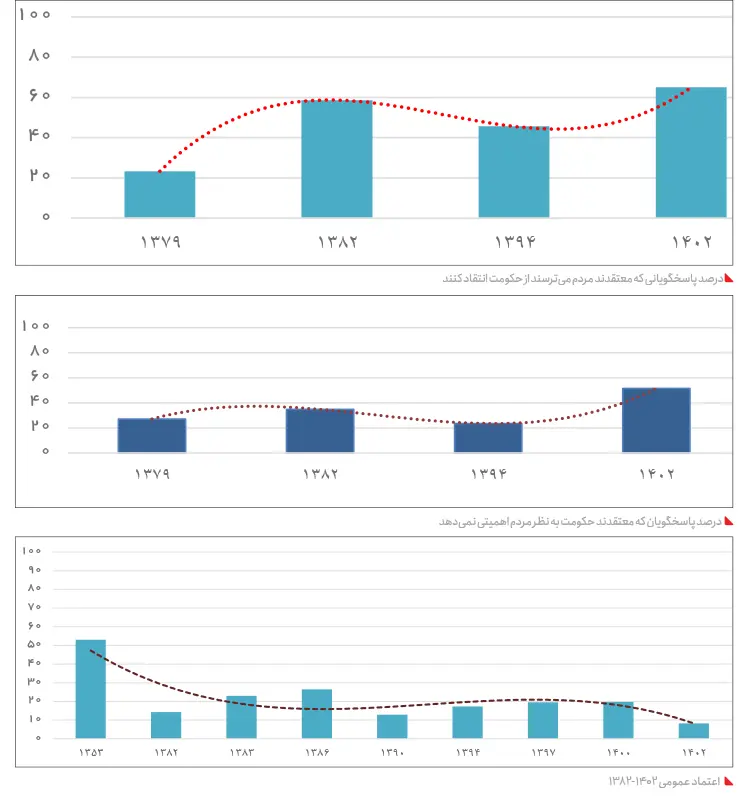
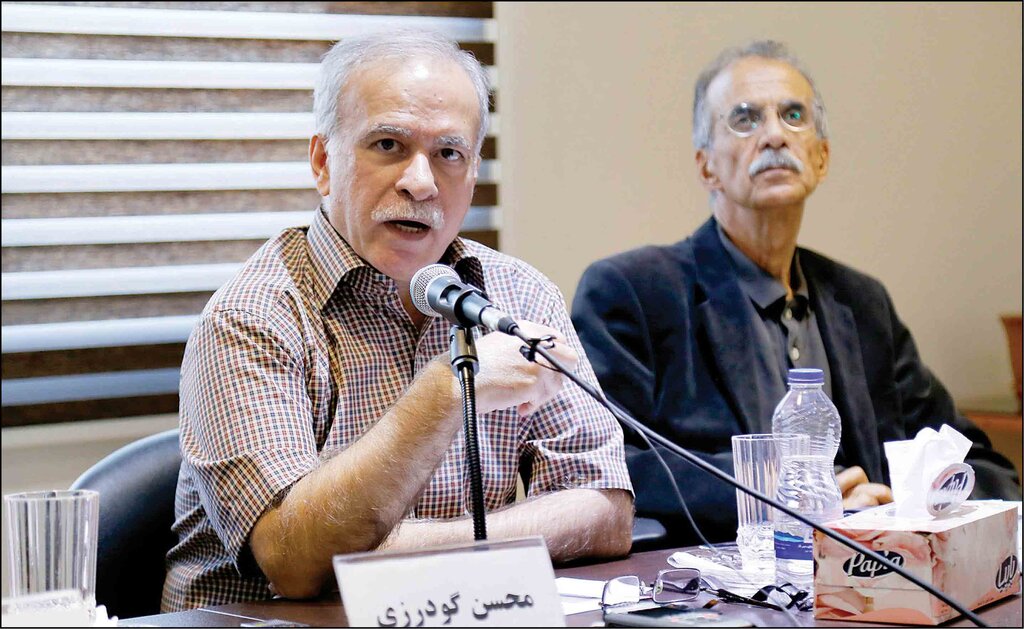
Dr. Mohsen Gudarzi; Sociologist and opinion polling researcher
Trust in the triple forces
The findings of numerous surveys show that the main pillars of the government have not been successful in gaining public trust and the level of trust in them has decreased over time; In 1402, the level of trust in the parliament decreased by 20%, the judiciary by 30%, and the government by 27%. The graph below shows that trust in the three forces has a downward trend.
Evaluation of government performance
One of the main factors of the decline of trust is the negative evaluation of the government’s performance, so that in 1400, those who considered the government’s performance to be successful in reducing unemployment, curbing inflation and inflation, alleviating poverty and curbing the cost of housing were less than 10%. The meaning of this number is that from the point of view of a large majority of people, the government has failed in fulfilling its main tasks, such as improving material life or the rule of law, and over time, the mentality of failure and inefficiency of the government has spread to different social layers.
Tendency to separate religion from politics
The ineffectiveness of the government has caused people to find a completely different attitude towards the most fundamental value of the political system, so that in 1999, about 40% agreed with the separation of religion from politics, but this ratio reached 73% in 1992. This approach has been accompanied by a decrease in adherence to religion and its manifestations such as hijab.
The majority of people both reject the fundamental values of the political system, and do not see its performance in the direction of their desires, and this has led to the separation of a large population of people from the government. The reflection of this situation can be seen in the attitude that people feel that their opinions and demands are not important to the government and they are worried that criticizing the government will have negative consequences for them.
Such a feeling, along with mistrust, leads to a kind of atmosphere of cynicism and suspicion, and creates a favorable environment for the duality of “us” and “them” and leads to the intensification of alienation. In this case, the relationship of this part of the people with the government is based on fear, mistrust and dissatisfaction instead of being based on agreement, cooperation, sense of belonging and loyalty. In a general word, it can be said that the social foundations of political power or its acceptability have weakened.
For this reason, the social context is less favorable for making tough decisions because these policies are interpreted and interpreted in the atmosphere of suspicion and in the worst possible case, and the policies are interpreted not to meet the needs of the people but to meet the needs of the government. This situation has increased the risks of making important decisions and policies in such a way that most governments avoid such decisions due to their consequences and possible protests.
The important thing to keep in mind here is that avoiding policy reform causes inefficiency, which increases pessimism and makes it harder to adopt improvement and reform policies. In other words, a negative escalating cycle is formed, from which it becomes harder to get out of the cycle every moment, and the costs of getting out of such a situation increase day by day. One of the points that should be kept in mind is that economic reforms in the conditions of weak government and society and growing pessimism – which is manifested in the feeling of social decline – become the fuel of social and political tensions and inflammations.
It should be kept in mind that this layer of collective opinions is more flexible and changes with changing policies and approaches, while if such a situation continues, it will become more institutionalized and its flexibility will be less. Therefore, the reform of this sector, which is achieved by changing the approach and abandoning some tension-causing policies, gives a sign of hope to the society in which effective steps can be taken to improve the situation. Evidence shows that the rate of separation is higher among young people, educated people and residents of big cities.
Erosion of social capital
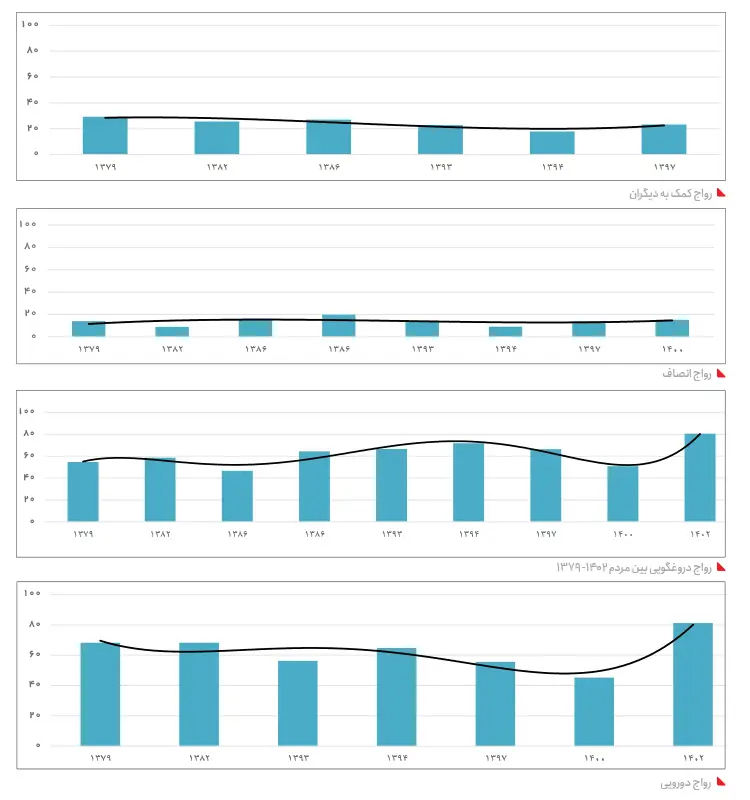
If we consider the government and the people on both sides of the pole, it may be thought that the weakening of one leads to the strengthening of the other. While the evidence shows that parallel to the weakening of the social foundations of political power, the society has also become weaker and the social capital has declined. The level of public trust – people’s trust in each other – has decreased from around 53% in 1354 to around 8% in 1402.
Association life, which is one of the main sources of trust formation, is not common and a small part of people are involved in this type of social life.. The deterioration of this situation can be seen from religious institutions that have had a privileged position in the collective life of Iranians for many decades. In 1402, only 15% were members or active in religious bodies. This situation is much worse for political institutions, so that in 1379, about 3% of people were involved in membership or activity in legal political parties and groups. In the case of trade unions, the membership ratio does not even reach 5%. These findings show that community life in its different religious, political and union forms is on the sidelines.
The third element in social capital is trust in social groups. The decline in public trust is not the same for all groups. Some groups that were at a higher level of trust in the past – such as professors, teachers and doctors – have partially lost their social status. However, these groups are still the most trusted social groups and are trusted by at least half of the population.
Less trust has been expressed in groups such as clerics (25%) and judges (28%). While the first two groups do not play a role in the country’s policies and may be known as critics of the status quo, the second two groups are considered to be the policymakers and leaders of the country from the point of view of public opinion. In a society where social capital declines, long-term actions such as economic investment grow less and short-term and temporary actions grow more.
In such a situation, the desire to migrate increases and the outflow of national and human capital increases. It should also be added that with the decline of social capital, people are more and more immersed in the core of their problems and they inevitably turn to individual ways for problems that are public.
The decline of religious behaviors and beliefs
At least two processes can be observed in religious attitudes and behaviors – aversion to religion and diversity of forms of religiosity. According to the findings of the survey, belief in the principles of religion, which always has the highest number of believers, has decreased over the years. For example, belief in Judgment Day has decreased from 94% in 1379 to 77% in 1402. Regarding prayer, the proportion of people adhering to prayer has increased from about 80% in 1379 to about 55% in 1402.
Although individual religious beliefs and behaviors have declined, participation in rituals has increased slightly and has reached 40% from 36%. The willingness to participate in this type of rituals is high, so that nearly 60% have expressed their willingness to participate in the Arbaeen procession. These findings show that some dimensions of religiosity have decreased at a faster rate, but for some aspects such as rituals, this decrease either did not occur or occurred at a slower rate.
The trend towards rituals should be discussed in a separate report, but it can be briefly said that the trend towards a kind of religiosity in which passion and emotions are more dominant is associated with a change in the field of religion and an increase in the role and importance of chanters. With all the evidence, it seems that this type of religiosity has no moral effects. For example, when public trust is declining, it means that religious communities do not play the role they had before the revolution in strengthening public trust.
It should be noted that a large part of people have maintained their religious tendencies and beliefs, while the gap between the government and the people is increasing and social capital has decreased rapidly. It can be said that this form of religiosity does not have the expected social and political effects. It seems that the institution of religion, as one of the sources that was efficient for social and political reconstruction before, does not have such a function in the current situation.
Feeling of social decay
“Sense of social decline” is a perceptual framework and its job is to receive information from the outside world and categorize, process and interpret it. The feeling of social decline means that the social world is continuously losing its quality, value and privileges. In experiencing this feeling, a person feels that the situation of his country is getting worse compared to the past, the people of his time have turned to moral vices instead of moral virtues, the society he lives in has been deprived of justice and fairness, and in short, the society has undergone ” sees social decline.
In this perceptual framework, the tendency to choose negative news is because this type of news supports this framework and does not find information or news that is against such a framework; The news that circulates abundantly in social networks and in the absence of an authoritative media, and ultimately leads to the strengthening of this framework.
One of the important components of the feeling of social decline is the depletion of morals in the social space. This is a common feeling among a large part of the people who live in a situation where moral standards are weak. As the graph shows, from the point of view of the majority of people, positive moral traits such as fairness and helping others are rare, but negative moral traits such as lying and hypocrisy are common traits.
hope for the future
Another component of the feeling of social decay is the worry about the future and its deterioration. Based on the available findings, the majority of people believe that the situation of Iranian society has worsened in various aspects compared to the past and will worsen in the future. Among them, they have such an idea about the future of religion in Iran. The dark image of the future has an implicit and important meaning. When part of the people are not optimistic about the future and think that the situation will get worse, it implicitly means the inability of the institutions whose task is to improve the situation.
For example, when people feel that the economic situation will worsen in the future, it means that institutions and organizations that are responsible for economic management cannot have a positive impact on the economic situation. In this context, it can be argued that the secularization of society means that religious institutions are not effective and efficient.
These trends indicate that the ability of Iranian society to produce social and political power has decreased. Religion, as one of the sources for reconstruction, has lost its previous functions, and the feeling of social decline has prevailed on isolated and atomized people so much that it has closed the way for them to change.
These processes generally show that the government and society have weakened, and the institution of religion, which played an important role in the reconstruction of society in the past, does not play such a role now. Although an important part of the people still adhere to religion, this adherence has no effect on the reconstruction of the political and moral atmosphere of the society. On the other hand, due to the spread of the feeling of social decline, the capacity for moral and social reconstruction has decreased, desperation and disillusionment with the state of the country has prevailed and finally led to desperation.
The continuation of this situation leads to the depletion of the power and strength of the society as a social system and threatens the existence of the whole society. The way out of this situation first of all requires acceptance of the current situation. Although this situation is difficult, it does not mean that the way of change is blocked. The path of change should be started from a place that has more flexibility. In the layers of public opinion, the level of political trust can be rebuilt more quickly, and in turn it will affect social trust.
Resources
Cultural tendencies and social attitudes: report of a national poll (1993), Research Institute of Communication Sciences
Survey of values and attitudes of Iranians (first wave 1379), Ministry of Culture and Islamic Guidance
Survey of values and attitudes of Iranians (second wave 2012), Ministry of Culture and Islamic Guidance
Social capital survey (2008), welfare organization and program and budget organization
Social Capital Survey (2006), Ministry of Interior
Cultural tendencies and social attitudes of Iranians (2008), Islamic Propaganda Organization
Social capital survey (2013), Ministry of Interior
Survey of values and attitudes of Iranians (third wave 2015), Ministry of Culture and Islamic Guidance
Social capital survey (2017), Ministry of Interior
Social capital survey (1400), Ministry of Interior
Survey of values and attitudes of Iranians (fourth wave of 1402), Ministry of Culture and Islamic Guidance
216216
منبع: www.khabaronline.ir

